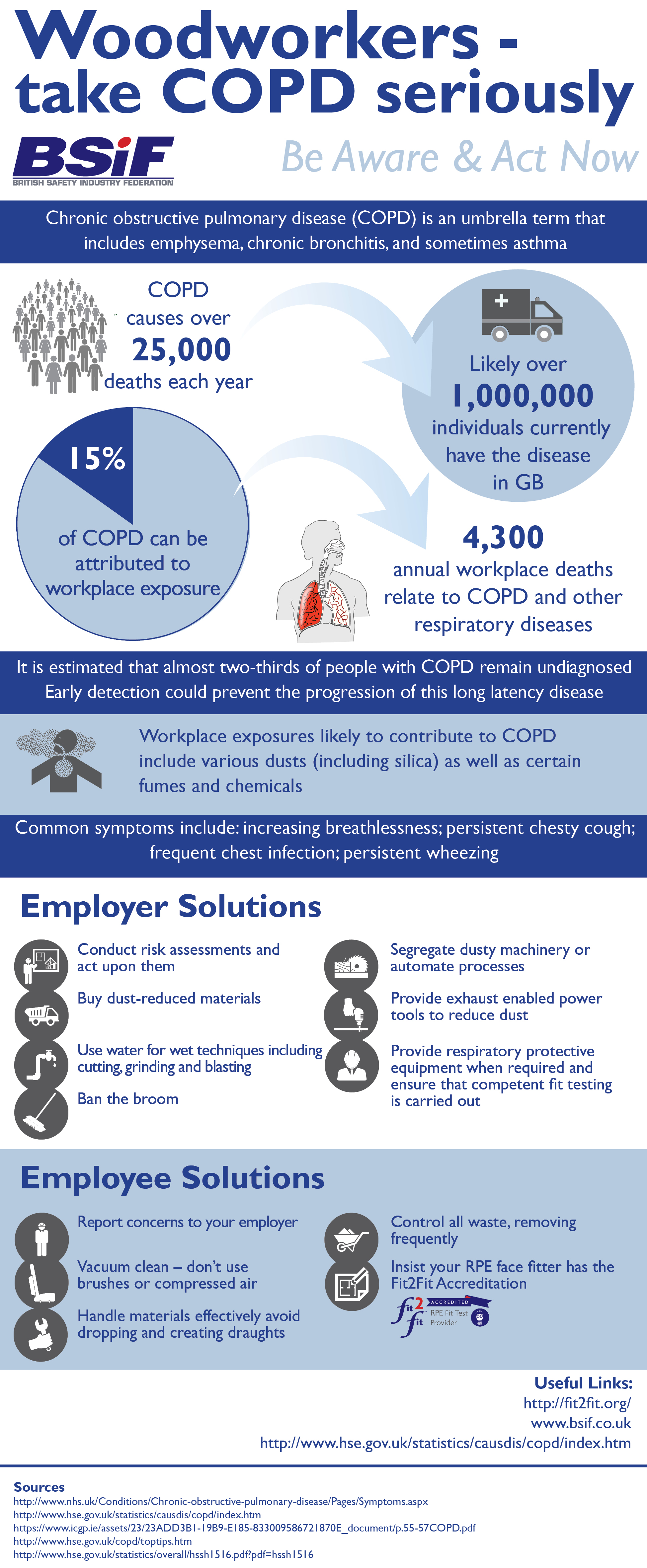 Alan Murray, CEO of the British Safety Industry Federation
Alan Murray, CEO of the British Safety Industry Federation
In the woodworking industry, workers are exposed to various dusts whilst completing daily tasks. Wood dust particularly can cause serious health problems; carpenters and joiners are four times more likely to suffer from asthma than other UK workers. In its chronic form, this has features similar to that of Chronic Obstructive Pulmonary Disease (COPD). Cancer of the nose can be caused by hardwood dust, whilst settled dust contains fine particles, damaging lungs in the long term and possibly leading to COPD and other respiratory conditions.
Hardwood and softwood dusts have levels that must not be exceeded, currently at 5mg/m3.
Exposure to wood dust must be as low as ‘reasonably practicable’. To mitigate these risks, Workplace Exposure Limits (WELs) set limits on the amount of dust in the air averaged over an eight- hour working day.
The BSIF is committed to raising awareness with both workers and employers on the risks of dust exposure and the control measures required that could reduce long term-ill health. The infographic below, illustrates the issue of COPD and outlines the changes both workers and employers could make in the workplace in order to reduce the risk of developing this life limiting disease.:
 INFOGRAPHIC
INFOGRAPHIC
RPE: How to choose it
If risk assessments indicate the need for respiratory protective equipment (RPE), then the employer is duty bound to provide his or her workers with equipment to provide the correct level of protection. But simply having the correct equipment isn’t the end of the story. RPE will not provide the proper protection if it leaks and the major cause of leaking is poor face fitting and facemasks and leakages around the seal. How can employers combat this issue, and how can employees have confidence that they have the right protection that will not impact them in years to come?
The Federation created the Fit2Fit Accreditation scheme in conjunction with the Health & Safety Executive (HSE) to provide both employers and employees with a stringent testing and approval process for face fit testing. The scheme confirms the competency of any person performing face piece fit testing, as they must show compliance with RPE face fitting in line with HSE guidance to achieve the accreditation. HSE inspectors recognise the Fit2Fit Accreditation as evidence of the competence of the face fit testing that has been carried out.
We know that working in the woodworking industry means workers are exposed to various dusts that could have serious long term health consequences. What we must do now is work together to ensure that the correct measures are in place to reduce these risks , encouraging both employers and employees to take action together. If RPE is deemed necessary, it absolutely must be fit for purpose.
The BSIF have produced helpful user friendly information through their “Clean Air? Take Care initiative. This resource can be downloaded from https://bsif.fit2fit.org/campaigns-projects/clean-air-take-care/
To find out more information on the Fit2Fit scheme and to find a tester, please visit https://bsif.co.uk/fit2fit or www.fit2fit.org
What is the BSIF?
 Established in 1994, the BSIF is the UK’s leading trade body for the safety industry. The Federation represents manufacturers and distributors of safety, health and environmental products; training companies; safety and environmental consultancies; together with accreditation and inspection houses, publishers and risk management consultancies. It is a Health and Safety Executive-recognised competent authority and the lead trade body for the PPE Regulations, as designated by the UK Department for Business, Innovation and Skills.
Established in 1994, the BSIF is the UK’s leading trade body for the safety industry. The Federation represents manufacturers and distributors of safety, health and environmental products; training companies; safety and environmental consultancies; together with accreditation and inspection houses, publishers and risk management consultancies. It is a Health and Safety Executive-recognised competent authority and the lead trade body for the PPE Regulations, as designated by the UK Department for Business, Innovation and Skills.
As a membership organisation, the Federation is clearly focused to bring benefits to its members, something which its core values and mission statement reflect. Its core values – influential, knowledgeable, beneficial and supportive – drive the BSIF’s everyday aims, to support and represent suppliers of safety products and services across all aspects of safety legislation, standards making and major occupational safety issues. Its mission statement – to continue to improve occupational safety, protect and develop the safety and environment protection markets and generate benefits for its members – will continue to drive the Federation over the next years. The BSIF will carry on working with its members and other relevant bodies to help ensure the industry is ‘working together in safety’.

 Alan Murray, CEO of the British Safety Industry Federation
Alan Murray, CEO of the British Safety Industry Federation INFOGRAPHIC
INFOGRAPHIC Established in 1994, the
Established in 1994, the